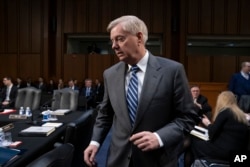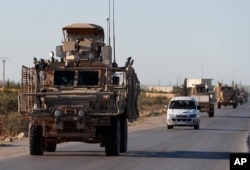U.S. President Donald Trump said Friday that his decision to leave a small number of U.S. troops in Syria did not constitute a reversal of his plan to withdraw all troops from the country.
"I am not reversing course," Trump told reporters at the White House.
"It's a very small, tiny fraction of the people we have," he said, referring to the more than 2,000 American troops in Syria who are supporting Kurdish forces fighting the last of the Islamic State group.
Administration officials said the United States would leave several hundred troops in Syria while the rest would be withdrawn.
Preventing 'resurging'
A senior U.S. defense official, using an acronym for Islamic State, told VOA that the troops would remain in Syria to help "enable local forces to keep ISIS from resurging." The official said the presumption was that the several hundred troops would be part of an international peacekeeping force.
Trump said Friday, "We have had tremendous success in defeating the caliphate." He added the United States "can leave a small force along with others … whether it's NATO troops or whoever it might be, so that it [the caliphate] doesn't start up again."
In December, Trump, anticipating the defeat of IS in Syria, made a surprise announcement that all U.S. forces would be out of Syria by the end of April. In doing so, he confounded many of America's European allies and angered some of his own allies in Washington.
Republican Sen. Lindsey Graham of South Carolina, one of Trump's closest allies on Capitol Hill, called it one of the "dumbest" ideas he'd heard.
According to Graham, acting Defense Secretary Patrick Shanahan agreed that a complete U.S. withdrawal from Syria could lead to a resurgence of Islamic State and a Turkish assault on Kurdish forces, and could give Iran an advantage inside Syria.
Reluctance among European leaders
European leaders have said they will be reluctant to fill the security gap when U.S. forces leave.
But Shanahan said U.S. allies had not rejected the idea of staying in Syria as an observer force.
He met Thursday at the Pentagon with a representative of one of the European allies, Belgian Defense Minister Didier Reynders, who said there had not been a blanket refusal from all U.S. allies to take part in a Syrian force.
"We are waiting for preparation of the withdrawal of U.S. troops and we are waiting now for more discussions about the way to prepare something," Reynders said.
Shanahan told reporters Friday that "our mission remains unchanged in terms of the defeat of ISIS." He said, "We're working towards stabilization and to enhance the security capability of local security forces."
Phone call to Erdogan
Trump spoke by telephone Thursday with Turkish President Recep Tayyip Erdogan. The White House said they agreed to keep working on creating a "potential safe zone" inside Syria, which would keep Kurdish forces safe from possible a Turkish attack.
America's Kurdish allies in Syria are concerned they would face Turkey's wrath following a U.S. withdrawal.
Turkey says the Syrian troops are allied with the Kurdistan Workers' Party (PKK), which has been fighting for greater Kurdish autonomy inside Turkey.
Turkey regards the PKK as a terrorist group.
VOA's Carla Babb at the Pentagon, Patsy Widakuswara at the White House and national security correspondent Jeff Seldin contributed to this report.







